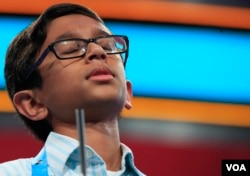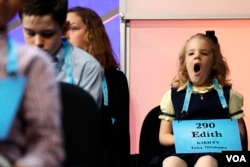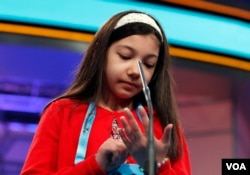Student Union
Indian-Americans Dominate the Spelling Bee, Again

The 12-year-old from Fresno, California, showed little emotion and needed little time as she correctly spelled word after word. Sometimes she would ask the official bee pronouncer, Jacques Bailly, all the important questions, such as “Part of speech?” and ″Language of origin?” Sometimes, though, she did not even do that.
Ananya seized her chance at victory when her only remaining opponent, Rohan Rajeev, misspelled a word. It was a simple-looking but rarely used Scandinavian word, “marram,” a beach grass.
Ananya then calmly spelled two words in a row. Her winning word was “marocain,” a clothing fabric.
“I knew them all,” Ananya later said.
Ananya hardly smiled, even when her parents and younger brother hurried onto the stage to hug her as colorful confetti fell. She took time to comfort Rohan, who remained in his seat, rubbing tears from his eyes.
“It’s like a dream come true,” Ananya said. “I’m so happy right now.”
She will take home more than $40,000 in cash and prizes.
Ananya is the 13th Indian-American in a row to win the bee. Like her predecessors, she prepared by taking part in highly competitive bees that are limited to Indian-Americans.
Bee Background
More than 290 spellers traveled to Washington earlier this week to take part in the Scripps National Spelling Bee. They qualified for the event by winning their regional or local spelling competitions.
Most of the competitors are in middle school. This year’s oldest competitor was 15. The youngest speller, Edith Fuller, just turned 6. Bee organizers said they believe she is the youngest person ever to qualify for the national spelling bee.
After qualifying in March when she was 5, Edith became famous nationwide. On Wednesday, in between rounds of competition, she held her own press conference.
"Edith, how does it feel to be the youngest speller in history?"
"It feels really exciting."
"Do you hope to come back to the bee next year?"
"I do, if I don’t win this time."
After her press conference, Edith correctly spelled “tapas” in the third round. But, her score on a written vocabulary test was not high enough to move her forward to the final on Thursday.
Preparing for the Bee
All bee words come from the more than 490,000 entries in Webster’s Third New International Dictionary.
Bee qualifiers study for many hours each day. They learn language patterns and the roots of words. A root is the foundation for other words.
Successful spellers know much about Latin, French, Greek and Sanskrit roots and rules. In the finals Thursday, spellers faced words including “choucroute” and “tulsi.” “Choucroute" is a French word for pickled cabbage. “Tulsi” is a kind of herb. That word entered the Hindi language from Sanskrit.
While some of this year’s bee words were recognizable to the average American, most were not. Almost all entered English from other languages. But a few -– McMansion, shopaholic and webisode –- were words new in American popular culture.
A few were even trademarked names, like “Klydonograph.” That name for an instrument that makes a photographic record of power surges stumped competitor Erin Howard in the final rounds. Klydonograph has no known roots or language of origin.
Last year’s winners
Nihar Janga was 11 years old when he tied with then-13-year-old Jairam Hathwar at the 2016 National Spelling Bee. The dazzling duo correctly spelled all the words they were given for 25 rounds, then judges finally declared them co-winners of the bee.
Winners are not permitted to compete again in following years, but both Nihar and Jairam came to Washington this year to watch.
“It was very packed at the beginning with a lot of media tours and events and meeting a lot of people," Jairam said. "After that it started to die down.”
Last was was the third bee in a row with two co-champions. This year, bee organizers added a tiebreaker test to make that outcome less likely.
The Bee’s final day
Melodie Loya is 12 years old. She is a small, quiet girl from New York. She was one of the 40 spellers who made it to the final rounds on Thursday.
Melodie, who is home-schooled, said she studied up to four hours each day to prepare for the national bee.
“I like with spelling that every word is made of roots, so certain languages are spelled a certain way and I think that’s really cool.”
She covered the walls of her bedroom with the words she misspelled while preparing.
Melodie made it to the sixth round of competition. Fewer than 30 spellers remained. Then, the bee’s pronouncer, Bailly, asked her to spell the word "subauditur."
Melodie took her time. She asked Bailly all the permitted questions: language of origin, definition, part of speech, and alternate pronunciations.
Then, she began to spell.
“S-U-B-A-U-D-I-T-
She paused before continuing.
“-O-R.”
A bell rang, signifying the spelling was incorrect. Melodie said “thank you” and walked off the stage to the area where competitors who have lost wait for their parents. Television cameras capture it all up close. Melodie’s eyes filled with tears as she hugged her mother.
Rohan Sachdev, 14, was the next speller up after Melodie’s dismissal. It was his second time competing at nationals. But he said it was his third year to attend the event.
“I was here in the sixth grade, and then last year my brother beat me in the county and so I still came here…I still knew much more than my brother, it’s just I got a tougher word than him. But he’s a pretty good speller, too.”
Sachdev easily made it through round six, and then round seven and eight. And by Thursday afternoon, he was one of 15 spellers left. He finished Thursday night in a tie for 12th place.
The American sports network ESPN carried the final spelling rounds live, just as they do with major sports events. The hashtag #SpellingBee trended on social media.
ESPN’s bee experts had not predicted Ananya Vinay’s win. They favored Texan Shourav Dasari as victor. He was one of four spellers remaining Thursday night when he got the word “Mogollon.”
Without asking Bailly for any information about the word, Shourav spelled "Mogollon" (an ancient civilization in southern North America) in just six seconds. He then returned to his seat before officials even announced he was right.
Social media users said the moment was "more exciting than anything in the NBA finals" -- the final round of the National Basketball Association championship, which was broadcast live on another network at the same time as the National Spelling Bee.
Later, though, Shourav misspelled “struldbrug,” a type of immortal creature Jonathan Swift invented in his novel Gulliver’s Travels. It has no recognizable roots or language patterns.
The bell rang, signaling the end of Shourav's final year of bee eligibility.
“I was honestly, absolutely shocked. It was stunning,” former speller Jacob Williamson said. “Shourav is one of the greatest spellers of all time, and he’s probably the best speller that never won."
AP contributed to this report.
Please leave a comment here, and visit us on Facebook, Twitter, Instagram and LinkedIn, thanks!
See all News Updates of the Day
- By VOA News
Competition grows for international students eyeing Yale

It’s tough to gain admission to Yale University, and it’s getting even tougher for international students as standout students from around the world set their sights on Yale.
The Yale Dale News, the campus newspaper, takes a look at the situation here.
- By VOA News
Student from Ethiopia says Whitman College culture made it easy to settle in

Ruth Chane, a computer science major from Ethiopia, writes about her experiences settling into student life at Whitman College in the U.S. state of Washington.
"The community at Whitman College made sure I felt welcomed even before I stepped foot on campus," she says.
- By VOA News
Claremont Colleges student gets a shock when she heads home to Shanghai

In The Student Life, the student newspaper for the Claremont Colleges, a consortium of five liberal art colleges and two graduate schools in Claremont, California, student Rochelle Lu writes about readjusting to her Shanghai home after spending a semester in the United States.
- By VOA News
Cedarville University aims to ease transition for international students

Cedarville University in the U.S. state of Ohio says it’s got more than 140 international students representing 44 countries.
Here, the school interviews Jonathan Sutton, director of international student services. He talks about his job and the opportunities for international students on campus.
- By VOA News
Morehouse College offers prospective students tips on applying and thriving

Morehouse College, a private, historically Black liberal arts college in the U.S. state of Georgia, offers a guide for international students interested in attending the school.
Among the tips to apply and thrive at Morehouse:
- Take advantage of the school’s orientation program
- Turn to the school’s Center for Academic Success for tutoring, support and more
- Immerse yourself in campus life via clubs and societies
- By Reuters
US reviews Columbia University contracts, grants over antisemitism allegations

The administration of President Donald Trump said on Monday it will review Columbia University's federal contracts and grants over allegations of antisemitism, which it says the educational institution has shown inaction in tackling.
Rights advocates note rising antisemitism, Islamophobia and anti-Arab bias since U.S. ally Israel's devastating military assault on Gaza began after Palestinian Hamas militants' deadly October 2023 attack.
The Justice Department said a month ago it formed a task force to fight antisemitism. The U.S. Departments of Health and Education and the General Services Administration jointly made the review announcement on Monday.
"The Federal Government's Task Force to Combat Anti-Semitism is considering Stop Work Orders for $51.4 million in contracts between Columbia University and the Federal Government," the joint statement said.
The agencies said no contracting actions had been taken yet.
"The task force will also conduct a comprehensive review of the more than $5 billion in federal grant commitments to Columbia University."
The agencies did not respond to requests for comment on whether there were similar reviews over allegations of Islamophobia and anti-Arab bias.
Columbia had no immediate comment. It previously said it made efforts to tackle antisemitism.
College protests
Trump has signed an executive order to combat antisemitism and pledged to deport non-citizen college students and others who took part in pro-Palestinian protests.
Columbia was at the center of college protests in which demonstrators demanded an end to U.S. support for Israel due to the humanitarian crisis caused by Israel's assault on Gaza. There were allegations of antisemitism and Islamophobia in protests and counter-protests.
During last summer's demonstrations around the country, classes were canceled, some university administrators resigned and student protesters were suspended and arrested.
While the intensity of protests has decreased in recent months, there were some demonstrations last week in New York after the expulsion of two students at Columbia University-affiliated Barnard College and after New York Governor Kathy Hochul ordered the removal of a Palestinian studies job listing at Hunter College.
A third student at Barnard College has since been expelled, this one related to the occupation of the Hamilton Hall building at Columbia last year.
Canada’s immigration overhaul signals global shift in student migration
From Europe to North America, nations are tightening their immigration policies. Now Canada, long seen as one of the world's most welcoming nations, has introduced sweeping changes affecting international students. The reforms highlight a growing global trend toward more restrictive immigration policies. Arzouma Kompaore reports from Calgary.
Trump administration opens antisemitism inquiries at 5 colleges, including Columbia and Berkeley

The Trump administration is opening new investigations into allegations of antisemitism at five U.S. universities including Columbia and the University of California, Berkeley, the Education Department announced Monday.
It's part of President Donald Trump's promise to take a tougher stance against campus antisemitism and deal out harsher penalties than the Biden administration, which settled a flurry of cases with universities in its final weeks. It comes the same day the Justice Department announced a new task force to root out antisemitism on college campuses.
In an order signed last week, Trump called for aggressive action to fight anti-Jewish bias on campuses, including the deportation of foreign students who have participated in pro-Palestinian protests.
Along with Columbia and Berkeley, the department is now investigating the University of Minnesota, Northwestern University and Portland State University. The cases were opened using the department's power to launch its own civil rights reviews, unlike the majority of investigations, which stem from complaints.
Messages seeking comment were left with all five universities.
A statement from the Education Department criticized colleges for tolerating antisemitism after Hamas' Oct. 7, 2023, attack on Israel and a wave of pro-Palestinian protests that followed. It also criticized the Biden administration for negotiating "toothless" resolutions that failed to hold schools accountable.
"Today, the Department is putting universities, colleges, and K-12 schools on notice: this administration will not tolerate continued institutional indifference to the wellbeing of Jewish students on American campuses," said Craig Trainor, the agency's acting assistant secretary for civil rights.
The department didn't provide details about the inquiries or how it decided which schools are being targeted. Presidents of Columbia and Northwestern were among those called to testify on Capitol Hill last year as Republicans sought accountability for allegations of antisemitism. The hearings contributed to the resignation of multiple university presidents, including Columbia's Minouche Shafik.
An October report from House Republicans accused Columbia of failing to punish pro-Palestinian students who took over a campus building, and it called Northwestern's negotiations with student protesters a "stunning capitulation."
House Republicans applauded the new investigations. Representative Tim Walberg, chair of the Education and Workforce Committee, said he was "glad that we finally have an administration who is taking action to protect Jewish students."
Trump's order also calls for a full review of antisemitism complaints filed with the Education Department since Oct. 7, 2023, including pending and resolved cases from the Biden administration. It encourages the Justice Department to take action to enforce civil rights laws.
Last week's order drew backlash from civil rights groups who said it violated First Amendment rights that protect political speech.
The new task force announced Monday includes the Justice and Education departments along with Health and Human Services.
"The Department takes seriously our responsibility to eradicate this hatred wherever it is found," said Leo Terrell, assistant attorney general for civil rights. "The Task Force to Combat Anti-Semitism is the first step in giving life to President Trump's renewed commitment to ending anti-Semitism in our schools."
- By VOA News
STEM, business top subjects for international students

The Times of India breaks down the most popular subjects for international students to study in the U.S.
STEM and business lead the pack. Read the full story here. (January 2025)
- By VOA News
Safety and visa difficulties among misconceptions about US colleges

U.S. News & World report addresses some of the misconceptions about U.S. colleges and universities, including the difficulty of getting a visa.
Read the full story here. (January 2025)
- By VOA News
Work opportunities help draw international students to US schools

US News & World Report details the three top factors in foreign students' decision to study in the U.S. They include research opportunities and the reputation of U.S. degrees. Read the full story here. (December 2024)
- By VOA News
British student talks about her culture shock in Ohio

A British student who did a year abroad at Bowling Green State University in Ohio talks about adjusting to life in America in a TikTok video, Newsweek magazine reports.
Among the biggest surprises? Portion sizes, jaywalking laws and dorm room beds.
Read the full story here. (December 2024)
- By VOA News
Harvard's Chan School tells international students what to expect

Harvard's T.H. Chan School of Public Health reaches out to international students by detailing the international student experience at the school.
Learn more about housing, life in Boston and more here.
- By Reuters
China unveils plan to build 'strong education nation' by 2035

China issued its first national action plan to build a "strong education nation" by 2035, which it said would help coordinate its education development, improve efficiencies in innovation and build a "strong country."
The plan, issued Sunday by the Communist Party's central committee and the State Council, aims to establish a "high quality education system" with accessibility and quality "among the best in the world."
The announcement was made after data on Friday showed China's population fell for a third consecutive year in 2024, with the number of deaths outpacing a slight increase in births, and experts cautioning that the downturn will worsen in the coming years.
High childcare and education costs have been a key factor for many young Chinese opting out of having children, at a time when many face uncertainty over their job prospects amid sluggish economic growth.
"By 2035, an education power will be built," the official Xinhua news agency said, adding that China would explore gradually expanding the scope of free education, increase "high-quality" undergraduate enrolment, expand postgraduate education, and raise the proportion of doctoral students.
The plan aims to promote "healthy growth and all-round development of students," making sure primary and secondary school students have at least two hours of physical activity daily, to effectively control the myopia, or nearsightedness, and obesity rates.
"Popularizing" mental health education and establishing a national student mental health monitoring and early warning system would also be implemented, it said.
It also aims to narrow the gap between urban and rural areas to improve the operating conditions of small-scale rural schools and improve the care system for children with disabilities and those belonging to agricultural migrant populations.
The plan also aims to steadily increase the supply of kindergarten places and the accessibility of preschool education.
- By VOA News
A look at financial aid options for international graduate students in US

The Open Notebook, a site focusing on educating journalists who cover science, has complied a list of U.S. graduate program financial aid information for international students.










